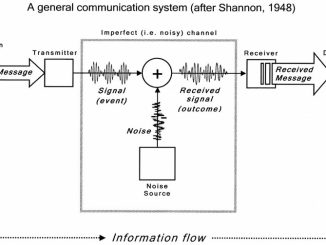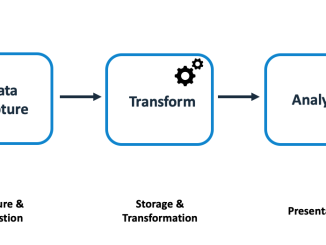 Just what is Data Driven? Or for that matter, what is a Data Driven Mindset? Why does it matter to identify Data Driven concepts? Starting from the basics, Data Driven "means that progress in an activity is compelled by data, rather than by intuition or by personal experience. Data-driven may refer to: Data-driven programming, ... Data-driven testing, ... Data-driven learning, ... Data-driven science, ... Data-driven control systems, ..."(1)If only it were that simple. We could all be mind-numbed robots acting on data without regard to the end-prize.
Just what is Data Driven? Or for that matter, what is a Data Driven Mindset? Why does it matter to identify Data Driven concepts? Starting from the basics, Data Driven "means that progress in an activity is compelled by data, rather than by intuition or by personal experience. Data-driven may refer to: Data-driven programming, ... Data-driven testing, ... Data-driven learning, ... Data-driven science, ... Data-driven control systems, ..."(1)If only it were that simple. We could all be mind-numbed robots acting on data without regard to the end-prize.
Data Driven Concepts Explained
While researching this topic, I found a concise explanation for Data Driven by Techopedia:(2)
Being data driven means that all decisions and processes are dictated by the data. If data points to sales being down because of brand perception, then specific actions can be taken to reverse that. If data analysis reveals that users of a current generation of mobile device are leaning toward a specific feature, then the next-generation device can make use of that knowledge.
Data driven essentially means that data dictates the actions taken by the ones that execute an event or process. This is most evident in the field of big data, where data and information are the basis of all actions and gathering and analyzing of data is the core motivator. Because data is now easier to gather and inexpensive to store, big data analytics is gaining more ground as the best tool for decision making in the business world. Having so much data gives powerful insight into the world and it allows people to manipulate outcomes because of this.
Such is Data Driven in the extreme. But shouldn't Data Driven be more tempered with the contributions of experts (Subject Matter Experts - SME) and the front-line humans most in-tune with the life of the business? Data Driven mindsets create spreadsheets and presentations which are then re-summarized until the essence of the operation is lost.
O'Reilly provided a great excerpt from the book Creating a Data-Driven Organization by Carl Anderson: "Data-Drivenness [sic] is about building tools, abilities, and, most crucially, a culture that acts on data."(3)
Well said. I encourage you to read the entire article.
The Mindset
As with any mindset, the mindset of being Data Driven is built from the underlying business purpose, vision, and strategy.
Mindsets matter.(4)
Your mindset plays a critical role in how you cope with life's challenges. In school, a growth mindset can contribute to greater achievement and increased effort. When facing a problem such as trying to find a new job, people with growth mindsets show greater resilience. They are more likely to persevere in the face of setbacks while those with fixed mindsets are more liable to give up.
Many companies promote their "safety mindset". Ask many of these executives and they will tell you that safety is not "job #1", nor is it "top priority". Safety is what we do, who we are. If it isn't safe, we do not proceed.
Often we hear "customer first mindset" or even "client driven". These mindset, again, are not a priority, a task, or even a mandate. The mindset of being customer or client driven is the way a business chooses to operate.
So a mindset is an attitude, an ethos, a way of thinking. A mindset is the en grained thought pattern and process from the board room to the front line.
How Then Should We Proceed?
Getting Started
It seems like a obvious understatement, but data collection must precede data utilization. A more delineated prerequisites would be:
- Data Collection - data from terminals, IoT end-point devices, analysis logs, contextual and environmental reference, etc. Note: regardless of the source of data, that data source defines the available options toward using that data.
- Data Qualification - data that is noisy is useless. Data must be referentially relevant (especially Geo-temporally referenced), calibrated and of the same units of measure, and expungable of irrelevant data (RPM of a machine at rest is not noisy, but the fact that the machine is at rest must be available or derivable). Note: outliers in a data set may be excluded and ignored - except when they cannot be so expunged.
- Data Availability - Data must be accessible, queryable, and traceable. Too often data is stored in inaccessible blobs, held inaccessible due to governance, or unverifiable as to providence. Note: When in doubt, strive for tabular data and avoid unstructured data. Unstructured data invariably becomes structure through forethought, or artificial thought.
The sanity check - are the various data sources joinable in a query? If they are, then they probable have a common reference key, common units of measure, connectable data sources, etc.
The Data Driven Mindset in Daily Life
As explained above, Data Driven is an interesting buzzword but is, in its purest form, overly restrictive. The Data Driven Mindset is not blind adherence to data induced mandates. The Data Driven Mindset is more a Data Informed Mindset. Data is the source is Information, Knowledge, Understanding, and Wisdom.(5)
Think
Andrew Chen raises interesting points in his blog Data Informed versus Data Driven.(6) I have summarized and paraphrased his conclusions here. I encourage you to read the entire article.
- Metrics are merely a reflection of a preexisting the product or business strategy
- The task is a messy problem that may have multiple acceptable answers and be disguised with poor data
- Data is inherently biased
Build models that are based on the source, quality, and reliability of the underlying data. Build models that focus on business outcomes, not academically curious nuances. (Let the data scientist daydream about the nuances.)
Think
Build solutions and optimizations that matter. Before beginning, think. Think about the objective, the scope, the success metrics. After building these solutions and optimizations, think again. Optimization is not about achieving the most efficient, productive, or elegant solution. Optimization is more often about finding the most achievable behavior.
Think informatively. I call this Digital Transformation. Others call it Data Inquisitvity.
"A data-driven mindset means you think outside of yourself and your personal biases, and instead, you focus on what the evidence says. You may still trust your gut, but you don’t act blindly. You challenge your assumptions, collect as much data as you can, and then take action."(7)
Conclusion
The Data Driven Mindset (Data Informed Mindset?) is a way of thinking that becomes pervasive within the focus of the individual and organization. Data queries, data charts, and data-backed presentations are not the objectives, just the end products. The Data Driven Mindset is a systems approach - data sources, data transport, data availability, and data analysis.
References
(1) Wikipedia entry for Data Driven
https://en.wikipedia.org/wiki/Data-driven
(2) Techopedia entry for Data Driven
https://www.techopedia.com/definition/18687/data-driven
(3) Creating a Data Driven Organization; Carl Anderson; Chapter 1. What Do We Mean by Data-Driven?
https://www.safaribooksonline.com/library/view/creating-a-data-driven/9781491916902/ch01.html
(4) Why Your Mindset Really Matters, Cultivating a Growth Mindset Can Boost Success;
Kendra Cherry; March 21, 2018
https://www.verywellmind.com/what-is-a-mindset-2795025
(5) Data, Information, Knowledge, Understanding, Wisdom; Mark Reynolds
http://digitaltransformation.engineer/2011/01/31/the-data-information-hierarcy/
(6) Data Informed versus Data Driven; Andrew Chen
http://andrewchen.co/know-the-difference-between-data-informed-and-versus-data-driven/
(7) How to Show You’re Data-Driven (When You’re Secretly Afraid of Numbers)
https://www.joinkoru.com/resources/how-to-show-youre-data-driven-when-youre-secretly-afraid-of-numbers/


